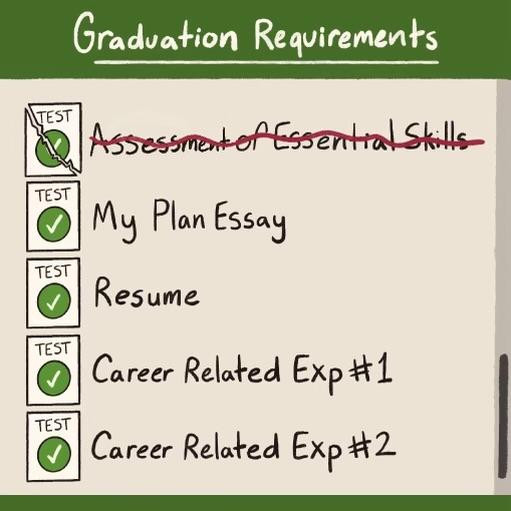In October, the Oregon Board of Education unanimously voted to suspend the Assessment of Essential Skills policy through 2029, according to the Oregonian. This suspension is an extension to the temporary pause to the Assessment requirement that began in 2020, due to the COVID-19 pandemic.
Previously, this policy’s primary purpose was to assess students’ ability to demonstrate nine “essential skills” through a series of tests. In order to graduate, proficiency had to be shown. These tests proved that students knew how to read and comprehend a variety of texts. They demonstrated their ability to write clearly and accurately, apply mathematics in a variety of settings, listen actively, and speak clearly and coherently. They also had to show they can think critically and analytically; while using technology to learn, live, and work. Finally, students demonstrated civic and community engagement, global literacy, and personal management and teamwork skills. While some schools may decide to continue administering the essential skills assessments, the state of Oregon has decided not to require these tests for the graduation of high school students.
Many believe this is the best decision to support students going forward. Per the Communications Director for the Oregon Department of Education (ODE), Marc Siegel, the original intention of the policy was “to ensure that students had the knowledge and skills necessary to pursue post-secondary opportunities, and to allow for students to have multiple options to meet that essential skills proficiency requirement.” The alternative method of proving these abilities was to implement portfolio-based protocols. However, portfolios proved more difficult for school districts to implement, meaning many schools opted for the Assessment of Essential Skills tests as their graduation requirement instead.
Yet, the requirement of the Assessment of Essential Skills was deemed as an inaccurate method to represent the knowledge and skills necessary for graduation. Siegel states: “The policy did not change student readiness for the post-secondary opportunities studied.”
Siegel continues by explaining why the Assessment is no longer required to show adequate knowledge for graduation. Students are already able to show their skills elsewhere through other cumulative demands for course credit. They demonstrate the nine essential skills and personalized learning requirements through Career Related Learning Experiences (CRLEs), an education plan and profile, and an extended application in order to graduate.
“The research we conducted in 2021-22 also shows that very few students were prohibited from graduation exclusively due to the Assessment of Essential Skills policy,” explains Siegel. “Most students [who lacked in the Assessment for graduation] had not met other graduation requirements in the areas of credit attainment, as well.” Further, while the test is no longer obligatory, students still must demonstrate Oregon content standards through their coursework. The nine essential skills continue to be used and taught in the classroom. Through coursework, credits, and overlapping requirements, students prove they understand the essential skills.
Additionally, the suspension of this requirement does not seem to be lowering the bar for Oregon students. In fact, it has been found that Oregon still sets some of the highest standards for graduation in the United States. According to a study by the Institute of Education Sciences in 2018, 24 course credits are required in Oregon, equivalent to only 12 other states and the District of Columbia. In comparison, other states require as few as 13 credits for graduation in the U.S. Subsequently, the Assessment policy “does not exist as a requirement in most states and is actually cautioned against by [the] U.S. Education Department Secretary [Dr. Miguel] Cardona, who urges states to reduce the use of high stakes of assessments in decisions such as graduation or promotion,” shares Siegel.
In an article by KTVL News 10, Dan Farley, ODE’s assistant superintendent of research, adds that “The ways that students met the requirements, the types of diplomas that they got, could all be predicted by race, ethnicity, IEP status, multilingual learner status.” Farley argues “We have to do what we can to disrupt those basically racist outcomes.” In an article by The Oregonian, “Higher rates of students of color, students learning English as a second language, and students with disabilities ended up having to take intensive senior-year writing and math classes to prove they deserved a diploma.”
In a public comment, Executive Director Foundations for a Better Oregon (FBO), Whitney Grubbs, wrote, “When state leaders remove or pause existing graduation requirements without proposing more effective and equitable alternatives, it risks leading Oregonians to believe that our state is lowering expectations to artificially mask disparities and improve outcomes.” Grubbs continues, saying, “This impression sadly reinforces a false and deeply prejudiced narrative that certain student groups are inherently unable to meet high expectations based on their identity, zip code, disability, or circumstances. Nothing could be further from the truth.” Grubs also pushes for a “clear, equitable, and coherent vision of accountability that assures our state is reliably supporting students to meet diploma requirements” as they change and adapt to serve their students.
As the suspension of this requirement is new — with its first introduction being within the past few years — there’s still much to learn about how the halting of this requirement will affect students. For one, this change doesn’t apply to private schools as they don’t perform the same standardized district or state testing, and their graduation requirements are separate. Siegel concludes that hopefully the “suspension provides an opportunity for the State Board and Oregon’s Legislature to collaborate with and engage more deeply with the community to design and implement policies that better serve our students.” There is no current plan for steps that will be taken during the pause of this requirement, but students are urged to have their voices heard during the decision-making process to ensure the best decisions are made for future graduation requirements.



































